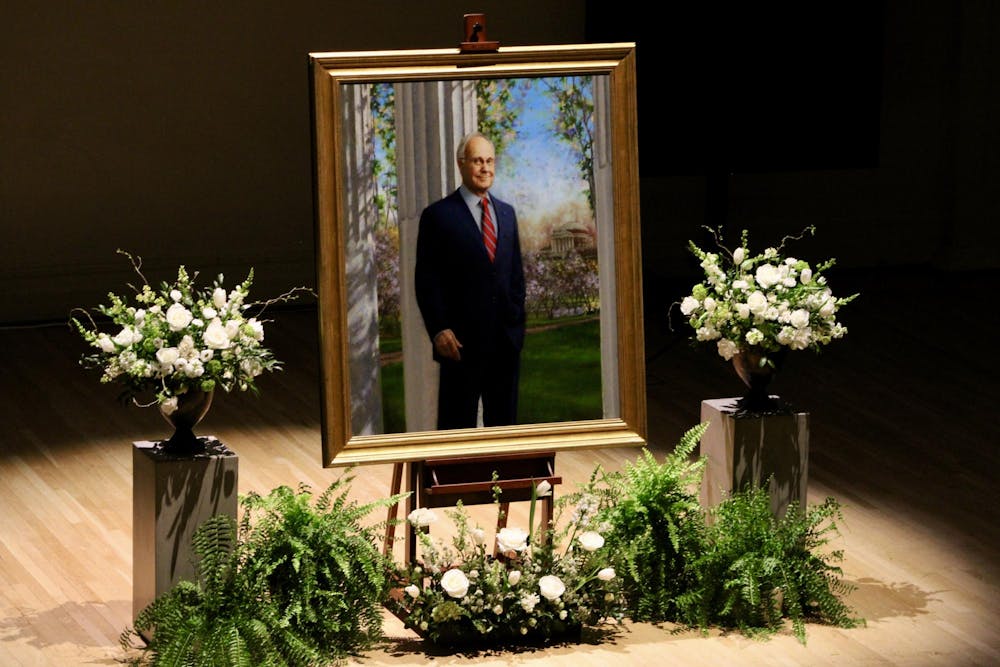Students, faculty, alumni and community members gathered Tuesday afternoon in Old Cabell Hall to honor the life and legacy of former University President John T. Casteen III, who passed away March 18 at the age of 81. The service highlighted Casteen’s transformative 20-year tenure as University president, his lifelong dedication to education and his deep commitment to public service.
Casteen’s son, John Casteen IV, an Assoc. Prof. of English and Principal at Brown Residential College, gave the eulogy, which he opened with a description of the letters he has received from those who were impacted by his father throughout their lives.
“He listened to [people], spent time [with them] and took them seriously,” Casteen said. “Especially in the case of students and young professionals, he saw potential in them that they hadn't recognized in themselves. He supported them in defining and realizing their goals. He fed people's curiosities. That's the man I want to talk to you about today, the person, not the president.”
Often referred to as “the father of the modern University,” Casteen served as the University’s seventh president from 1990 to 2010. He earned his undergraduate and doctoral degrees in English from the University before becoming a professor, administrator and ultimately President. The service included a recital of Cædmon's Hymn, the oldest surviving poem in English, to honor his love for the subject.
Prof. Elizabeth Fowler also spoke at the memorial, and remembered Casteen as an instructor with a deep love for English literature.
"I am beyond grateful to be able to say that, after he stepped down from the [University] presidency, he taught eight years of courses in a crowning addendum to his service here," Fowler said. “... He helped us in [the English department] fill a large role in our curriculum when we really needed him, when our students really needed him.”
University President Jim Ryan also spoke at the memorial, and noted that during Casteen’s time as president he faced significant financial challenges, including a 20 percent reduction — almost $50 million — in state support. Ryan remembered Casteen for successfully advocating for University's financial autonomy from state funding, growing the University endowment from $500 million in 1990 to over $5 billion by 2007 through extensive fundraising.
“[Casteen] adopted the view that public universities needed a measure of financial and operational autonomy that would enable them to continue to thrive, even when the state faced budgetary constraints,” Ryan said.
Angela Davis, the 2011 Recipient of the John T. Casteen III Award and retired Special Assistant to Vice President and Chief Student Affairs Officer, who had known Casteen since 1975, spoke at the memorial as well. She noted that in addition to his fundraising efforts, Casteen was known for setting up a new office at the University — the Office of Diversity, Equity and Inclusion— and commended Casteen for his commitment to representation.
“John understood that it wasn't good enough to just go to black churches to recruit black students and open the door at U.Va.,” Davis said. “It was just as critical to diversify the administrative leadership."
The Office of DEI was recently dissolved following a resolution by the Board of Visitors.
Ryan also spoke about the value of Casteen’s other accomplishments, which included expanding the University's physical infrastructure, adding over 130 buildings and increasing academic space by 40 percent. Ryan commended Casteen’s emphasis on access and affordability for all students, and noted that he established the AccessUVA program in 2003 to make the University an affordable public institution.
Ryan spoke about his decision to become president, sharing that he discussed the role with Casteen before accepting the offer to become the ninth University President.
“In the first conversation and in all the ones that followed, John conveyed, directly and indirectly, that being president of the University of Virginia was a worthy endeavor,” Ryan said. “It was clear to me that, for John, it was and remained the honor and privilege of a lifetime.”







